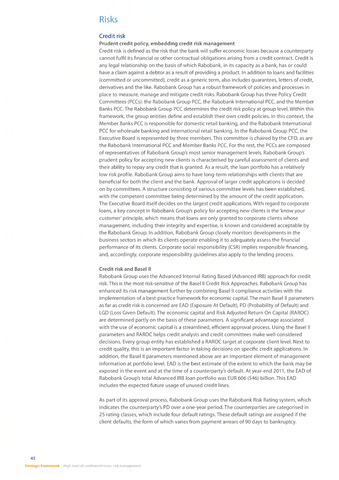Risks
Credit risk
Prudent credit policy, embedding credit risk management
Credit risk is defined as the risk that the bank will suffer economic losses because a counterparty
cannot fulfil its financial or other contractual obligations arising from a credit contract. Credit is
any legal relationship on the basis of which Rabobank, in its capacity as a bank, has or could
have a claim against a debtor as a result of providing a product. In addition to loans and facilities
(committed or uncommitted), credit as a generic term, also includes guarantees, letters of credit,
derivatives and the like. Rabobank Group has a robust framework of policies and processes in
place to measure, manage and mitigate credit risks. Rabobank Group has three Policy Credit
Committees (PCCs): the Rabobank Group PCC, the Rabobank International PCC, and the Member
Banks PCC. The Rabobank Group PCC determines the credit risk policy at group level. Within this
framework, the group entities define and establish their own credit policies. In this context, the
Member Banks PCC is responsible for domestic retail banking, and the Rabobank International
PCC for wholesale banking and international retail banking. In the Rabobank Group PCC, the
Executive Board is represented by three members. This committee is chaired by the CFO, as are
the Rabobank International PCC and Member Banks PCC. For the rest, the PCCs are composed
of representatives of Rabobank Group's most senior management levels. Rabobank Group's
prudent policy for accepting new clients is characterised by careful assessment of clients and
their ability to repay any credit that is granted. As a result, the loan portfolio has a relatively
low risk profile. Rabobank Group aims to have long-term relationships with clients that are
beneficial for both the client and the bank. Approval of larger credit applications is decided
on by committees. A structure consisting of various committee levels has been established,
with the competent committee being determined by the amount of the credit application.
The Executive Board itself decides on the largest credit applications. With regard to corporate
loans, a key concept in Rabobank Group's policy for accepting new clients is the 'know your
customer' principle, which means that loans are only granted to corporate clients whose
management, including their integrity and expertise, is known and considered acceptable by
the Rabobank Group. In addition, Rabobank Group closely monitors developments in the
business sectors in which its clients operate enabling it to adequately assess the financial
performance of its clients. Corporate social responsibility (CSR) implies responsible financing,
and, accordingly, corporate responsibility guidelines also apply to the lending process.
Credit risk and Basel II
Rabobank Group uses the Advanced Internal Rating Based (Advanced IRB) approach for credit
risk. This is the most risk-sensitive of the Basel II Credit Risk Approaches. Rabobank Group has
enhanced its risk management further by combining Basel II compliance activities with the
implementation of a best-practice framework for economic capital. The main Basel II parameters
as far as credit risk is concerned are EAD (Exposure At Default), PD (Probability of Default) and
LGD (Loss Given Default). The economic capital and Risk Adjusted Return On Capital (RAROC)
are determined partly on the basis of these parameters. A significant advantage associated
with the use of economic capital is a streamlined, efficient approval process. Using the Basel II
parameters and RAROC helps credit analysts and credit committees make well-considered
decisions. Every group entity has established a RAROC target at corporate client level. Next to
credit quality, this is an important factor in taking decisions on specific credit applications. In
addition, the Basel II parameters mentioned above are an important element of management
information at portfolio level. EAD is the best estimate of the extent to which the bank may be
exposed in the event and at the time of a counterparty's default. At year-end 2011, the EAD of
Rabobank Group's total Advanced IRB loan portfolio was EUR 606 (546) billion.This EAD
includes the expected future usage of unused credit lines.
As part of its approval process, Rabobank Group uses the Rabobank Risk Rating system, which
indicates the counterparty's PD over a one-year period.The counterparties are categorised in
25 rating classes, which include four default ratings. These default ratings are assigned if the
client defaults, the form of which varies from payment arrears of 90 days to bankruptcy.
45
Strategic Framework High level of creditworthiness: risk management

